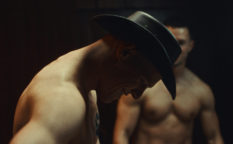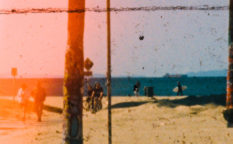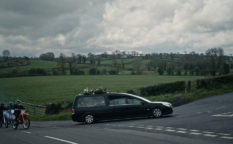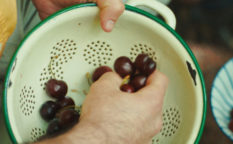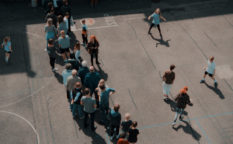Cyril Aris: “In general, Lebanese people find a lot of humor in tragedies”
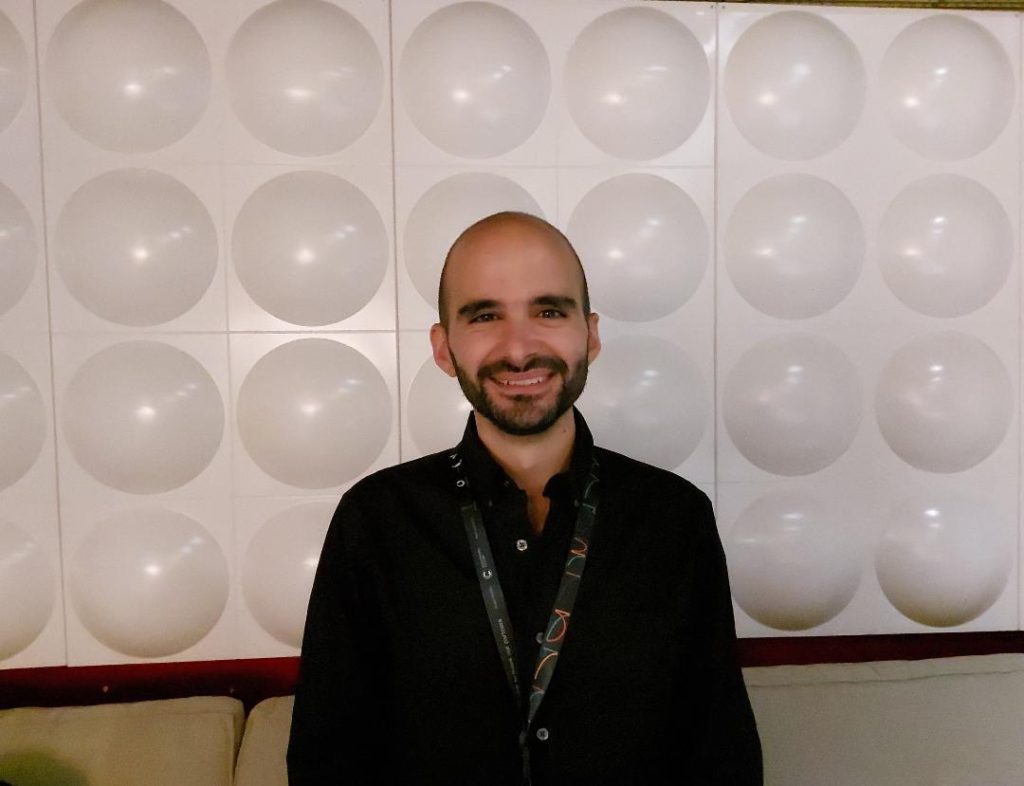
In words of Francis Bacon (Essays, 1597), the folly of one man is the fortune of another, and Cyril Aris’ documentary Dancing on The Edge Of A Volcano is a solid proof that he wasn’t wrong. When he started shooting the film, Lebanese helmer wasn’t aware about the things he was going to witness, nor did he actually know that his initial wish to document the chaos that ensued after the devastating explosion in Beirut’s harbour on August 4th 2020, would take him to another film set.
Over a period of one year Aris followed the crew of Mounia Akl’s debut feature Costa Brava, Lebanon, an eco-family drama that eventually had its world premiere in Venice’s Orizzonti Extra section in 2021. It was the time of big challenges not just for the filmmakers, but for all citizens of Beirut who mobilized forces to clean up and reconstruct their city. In all chaos that ensued after the explosion of a large amount of ammonium nitrate stored at the Port, Akl and her crew were fighting against incredible, constantly growing problems to make the project happen.
Dancing On The Edge Of A Volcano was one of few documentaries that made it in the international competition of Karlovy Vary International Film Festival, running for the Crystal Globe. We met with Cyril Aris in festival center to find out what motivated him to make this movie, about the challenges and surprises during the making of, and about the people and spirit of Beirut.
Whatever could go wrong during the making of Costa Brava did, and there was a joke among critics after the official screening of your documentary that we will never complain about having bad luck again. Obviously, you couldn’t predict what was going to happen, but what I can ask you about is the origin of the idea.
I wasn’t planning of making a documentary about that and following the crew of Costa Brava. What happend was that after the explosion on October 4th 2020 when half of the city blew up, I was walking through the streets of my neighbourhood that I grew up in, and where I still live. Everything was disfigured, destroyed, and getting acquainted with this new reality was shocking. Everything I knew was gone, and it was so violent that I decided to take the camera and just document. It was an impulse, and not a thought. I wasn’t even thinking about making a movie at that moment, just filming. And then my camera was attracted by regular, common Lebanese residents that flocked Beirut in order to clean the streets and rebuild the city. Obviously, we had a completely incompetent, criminal government, and these are very sweet words to describe it. I was quite interested in filming the grassroots efforts of people to reconstruct their city. But then, of course, I started asking myself a question about my role as a filmmaker/ artist in all of it. When I saw that Mounia and her team of Costa Brava for which I was scheduled to be the editor, were debating whether to continue or to give up – and they were also questioning what was their role – I realised that we were going through the same questioning process. It felt like an excuse for a narrative, and almost as if this were going to be a nice three act structure; a fiction film in its storytelling through which I could explore bigger questions that I am interested in, and which relate to getting back on one’s feet after a major traumatic event that happens on the national, collective level. And also, to explore te question of the role of the cinema in times like that. It’s both good and it’s bad because on the one hand, it’s a good material for the film, but on the other, the country was spirealing further and further down, which made me feel quite useless in my efforts. There is a kind of pesimistic view that despite of the fact that the project was made, saw the light of the day, it was very cathartic for us. So I think that the juxtaposition of these ambivalent feelings was what I wanted to explore.
What comes up several times in the movie is people’s wish to get out and leave Lebanon behind, which coomes from a place of disappointment and hurt. It feels as a read thread.
You are absolutely right in what you are saying, and there is this constant question that has been become woven into the fabric of the Lebanese society, a constant wish to immigrate and start anew somewhere else. It is no coincidence that our biggest export are people. The society really hangs on this very weird economic model of people who send money from abroad. And actually, the 40-years-old documentary Whispers by Maroun Baghdadi which I reference to several times in the film, dealt with the same question. I realised that this has beeen a very common theme in the Lebanese cinema because it very much reflects the nature of our society and this constant questioning of staying or leaving: Should we fight and resist or just abandon everything and go somewhere else? And so, I am very glad that this dilemma sustained throughout the film.
The film is filled with humour which I guess was essential to deal with all the hardships, but since you were filming for over a year, how difficult was it to edit the extensive material?
Not just those characters, but in general Lebanese people find a lot of humor in tragedies. I didn’t want the film to become self-victimizing, because presenting people as complainers wouldn’t correspond the truth. In Lebanon you do find moments of very intense nervous laughters and very dark humor, and I think that this humor really rises from the tragic circumstances. It is a tool for keeping our sanity. If we sat all day long and thought about what happened to us, we would go completely bonkers. So, it was important to me to transcribe that humor, and since it’s a documentary it is not fake. I wanted to keep those moments balanced especially after heavy scenes in order to give a bit of a breather to the audience and make them keep on watching, or otherwise they would get tired of the drab.
There is also one scene with the Beirut’s night life, in which we see people dancing their sorrows away.
This is both impressive and kind of repulsive at the same time. The night life is really extremely well developed and people party a lot. Beirut is known for huge parties. On the one hand, it’s just amazing that people have a constant joie de vivre despite of everything, but on the other hand I keep on asking myself about what we are doing. Instead of confronting our problems, we just sweep the dust under the carpet. The irony is that some of the biggest clubs are quite close to the port, so many of them were the most impacted by the explosion. Here we are almost three years after dancing on the same soil that witnessed such a tragedy. At the same time, can you blame them? Of course not. Are they going to shut down and live in this depressive state? That’s not very sustainable.
There is also an invisible layer, because you are a filmmaker who also is shooting under special conditions.
Obviously, shooting a documentary involves far less people than doing fiction. There is much less logistics and we are a fly on the wall trying to capture the moment. From the technical aspect it wasn’t that complicated except of the minor staff such as getting a generator for lights going, because there was no gas. Compared to the obstacles that Costa Brava had it was nowhere near, but when it comes to the emotional involvement or our mental connection, yes, it was exactly the same and this was precisely why I was filming them. We were all going through the same thing, the trauma that we were trying to overcome and to create something, so it placed me not just as an observer objectively watching them, I was able to tell the exact moment of their desasperation. I could empathize with them and project my own doubts and fears through them, and it helped me to digest my own feelings by experiencing the same as my characters. So, there were no filmmakers filming characters, but more of a collective experience. I was behind the camera and they were in front of it. They were also behind their own camera, so there are many layers to the film.
When did you become aware of the fact that there was something completely extraordinary happening in front of your eyes?
We had this running joke with Mounia and Miriam that the more hardships they go through, the better my movie gets, and the easier it goes for them, the less of material I will get. We kind of said: “Can we not compete over misery, and can we get the best of both worlds?” (laughs) I think that the first moment I realised that something was awkward was on the 4th-5th day of the shoot when Mounia and her two actors – the litle girl and the teenager -were rehearsing together. As they are trying to act, Nadia Charbel bursts in tears because she starts talking about her friend who died. Here I understood that we were much more affected as we were aware of it. The time was especially difficult for actors to be in a different character just for a moment, because they immediately had the dark baggage coming back. Here I understood that there was something very complex happening. I really questioned whether the filmmaking process was going to heal these wounds.
I found it very touching when one of the twins at one point says “I don’t like Lebanon anymore” quoting the explosion and the heavy air traffic as reasons.
I think that the footage I will be taking about is not in the film, but I definitely fimed it during the particular rehearsal scene mentiond previously. In that scene, Ceana, the little girl starts saying how Lebanon is a beautiful country because of different reasons she then listed, and two months later here she is saying that she actually doesn’t like it anymore. She then told us things that she obviously picked up from the adults: the fact that the food got so expensive, how mom and dad had to work all they to feed their kids, etc. That shift was heavy, because it was a full 180° switch, but it also goes back to the question if the film was going to heal people or pile up more emotions.
After almost a year of shooting, you must have anded up with a huge material. Were the diting decisions difficult for you?
It was two of us. I was cutting, but I had help by the French-Tunisian editor Nadia Ben Rachid who’s absolutely excellent. She knows the situation in Lebanon, but as she wasn’t there, she had an objective viewpoint on the material. For me it’s different. I know all the people, their stories and worries, and she had the necessary distance to point out what was an outstanding moment, and what wasn’t. It was very interesting to have another person who understands but isn’t in it as much as me. I have to give her a lot of credit for that.
What did you feel when you watched your film as the final product on the cinema screen?
It was very tough. As a director you never have the feeling you are watching your work for the first time since you were working on it, putting all the building blocks together, so I never saw it objectively. Don’t think that I am avoiding the question. I will try to answer it. I am glad and satisfied that I was able to capture that specific moment in our lives which is really embedded in my generation. All Lebanese people were traumatized by it, but our parents had a civil war for a decade, and we had these few seconds that had as much impact in terms of destruction as the war. So when I see it, I am reminded of how it felt. It sounded like that: the glass, the planes, the TV, the sweeping brooms. When I see it I really hang on to this feeling, and I am glad that it was kept on the camera. I think that it is a good document to have, to make people empathize and to be in Lebanon for the length of 87 minutes, and to understand a bit more the struggle the citizens are going through, and not in a victimizing way but creating a bond.
And what were the reactions of the Costa Brava film crew?
They had seen a cut at one point when we had the whole movie together, and I remember that their first reaction was that the whole thing was way funnier that they could imagine. Again, we are talking about August 4th, the explosion and death, but they also felt that Dancing On The Edge of A Volcano replicated a bubble in which they felt comfort, affection and love. In summer there was really none of it because of the crisis and everything. It goes a bit with the line of what I said before that we were all happy that this document can stand. Myriam (the producer) made a joke several times, because it was a coproduction between several countries, that if their movie never gets made she will show my documentary to explain why. She said “this is my get-away from the jail card if someone comes after me.” Paul Thomas Anderson once said that it’s a miracle every time a movie gets made. And here in this case it’s even more of a miracle. But they made it and it had a fairly happy ending in regards to narration, emotionally not so much because it stay ambiguous.
How did you work with sound, because all the crunching of the glass and noises coming from everywhere join together in lous symphony?
A lot of credit goes to my sound designer Victor Bresse and my re-recording mixer Lama sawaya. The idea was to re-create the soundscape of Bierut and the weeks following the explosion. Everything was actually very loud. It wasn’t about neoghbour sweeping the glass, the whole neighbourhood did it at differents times. Some did it 5 minutes after, some after a week. There was this constant sound that came very layered. Thdre was lots of construction going on, loud thumps, planes and helicopters passing, sirens for a week. We wanted to create that soundscape without stylizing much. There is a fine balance, which is why I give a lot of credit to my sound department.

